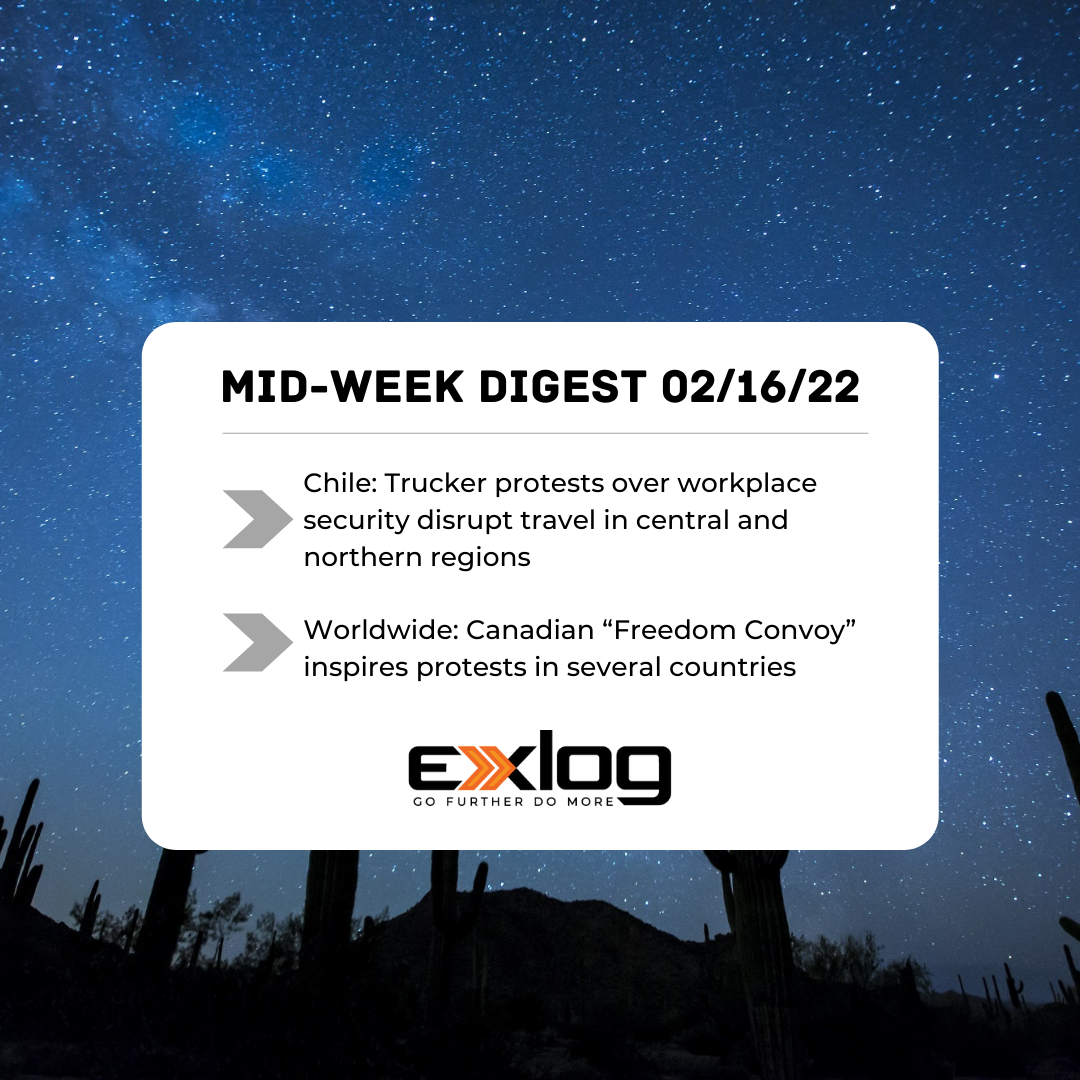Chilean truckers protest workplace insecurity and Canadian trucker rallies draw global support
Chile: Trucker protests over workplace security disrupt travel in central and northern regions
Trucker protests over migration and rising crime caused disruption to road routes and airport operations in central and northern Chile between Feb. 11-13 and prompted the government to declare a state of emergency in four northern provinces. The protests were triggered by the death of a truck driver during an argument with Venezuelan migrants in Antofagasta on Feb. 10; three suspects were arrested in connection with the incident. Protesters blocked roads surrounding the mining cities of Antofagasta and Iquique, several nearby towns, and on the outskirts of the capital Santiago. All LATAM, Sky and JetSmart flights at the Arturo Merino Benítez International Airport in Santiago were canceled on Feb. 11, as well local flights between Santiago and Iquique on Feb. 13, due to blockades on roads leading to the airports. The state of emergency – declared in the Arica, Parinacota, Tamarugal, and Loa provinces on Feb. 12 – will last for 15 days and involves the deployment of additional security personnel to border areas to stem illegal migration. According to local authorities, between 400-500 Venezuelan nationals have been crossing the border from Bolivia into Chile on a daily basis since November 2021; the UN Refugee Agency (UNHCR) estimates indicate that 448,100 refugees and migrants from Venezuela currently reside in Chile. Due to the lack of adequate paperwork, migrants are unable to find formal employment and frequently set up shelters in squares and other public spaces. Open sources indicate that countrywide crime rates have been increasing in the last three years, and many Chileans associate a rise in criminal activity with the increase in irregular migration, which has sparked anti-migration protests in Iquique and other northern areas in the past three weeks. On Feb. 13, approximately 17 transport unions representing truck drivers announced the end of the strike after they had reached an agreement with the authorities regarding improved highway security measures and the implementation of the Immigration Law provisions that will allow deportation of foreign nationals in “irregular situations”. However, future incidents undermining truckers’ safety cannot be completely ruled out, which suggests similar demonstrations demanding additional government measures are possible in the medium-to-long-term.
Worldwide: Canadian “Freedom Convoy” inspires protests in several countries
Since the start of trucker protests in Canada, similar demonstrations over vaccination mandates and other COVID-19 restrictions have swept several countries across the world, triggering large mobilizations of security forces and causing significant travel disruptions. On Feb. 10, the governments of France and Belgium jointly released a ban on protests linked to Canada’s “Freedom Convoy” after receiving reports of planned demonstrations in Paris and Brussels in response to the EU’s COVID-19 pass. Nevertheless, approximately 32,000 people participated in protests across France on Feb. 12; 7,600 people gathered in Paris alone, creating significant traffic disruptions around the Arc de Triomphe and on the Champs Elysees. In Brussels, police installed checkpoints to divert demonstrators into a designated “static protest” location to minimize disruption to the city, where around 130 vehicles and 200 people gathered for the rally. While protesters have attempted to replicate similar convoys in other European cities – including Vienna and the Hague – these demonstrations have not caused significant disruptions. On Feb. 7, several hundred protesters marched across the Brooklyn Bridge in New York to denounce vaccine mandates. Thousands of people participated in protests in Australia and New Zealand last week, disrupting traffic, public transportation schedules and airport operations. Similarly, one of Israel’s main highways, Route 1, was briefly blocked by dozens of vehicles on Feb. 15 as thousands of protesters marched down the roadway to denounce state-mandated vaccination. While the recent protests drew inspiration from the Canadian movement, government-imposed COVID-19 regulations have sparked similar demonstrations across the US, Europe, New Zealand and other countries in recent months, indicating a global trend surrounding popular dissatisfaction with strict COVID-19 policies and vaccine mandates. Pandemic-related civil unrest is unlikely to subside in the short-to-medium term, posing political challenges to governments around the world and threatening significant economic impact due to interrupted border activity, incidents of vandalism or potential escalation to violence.


